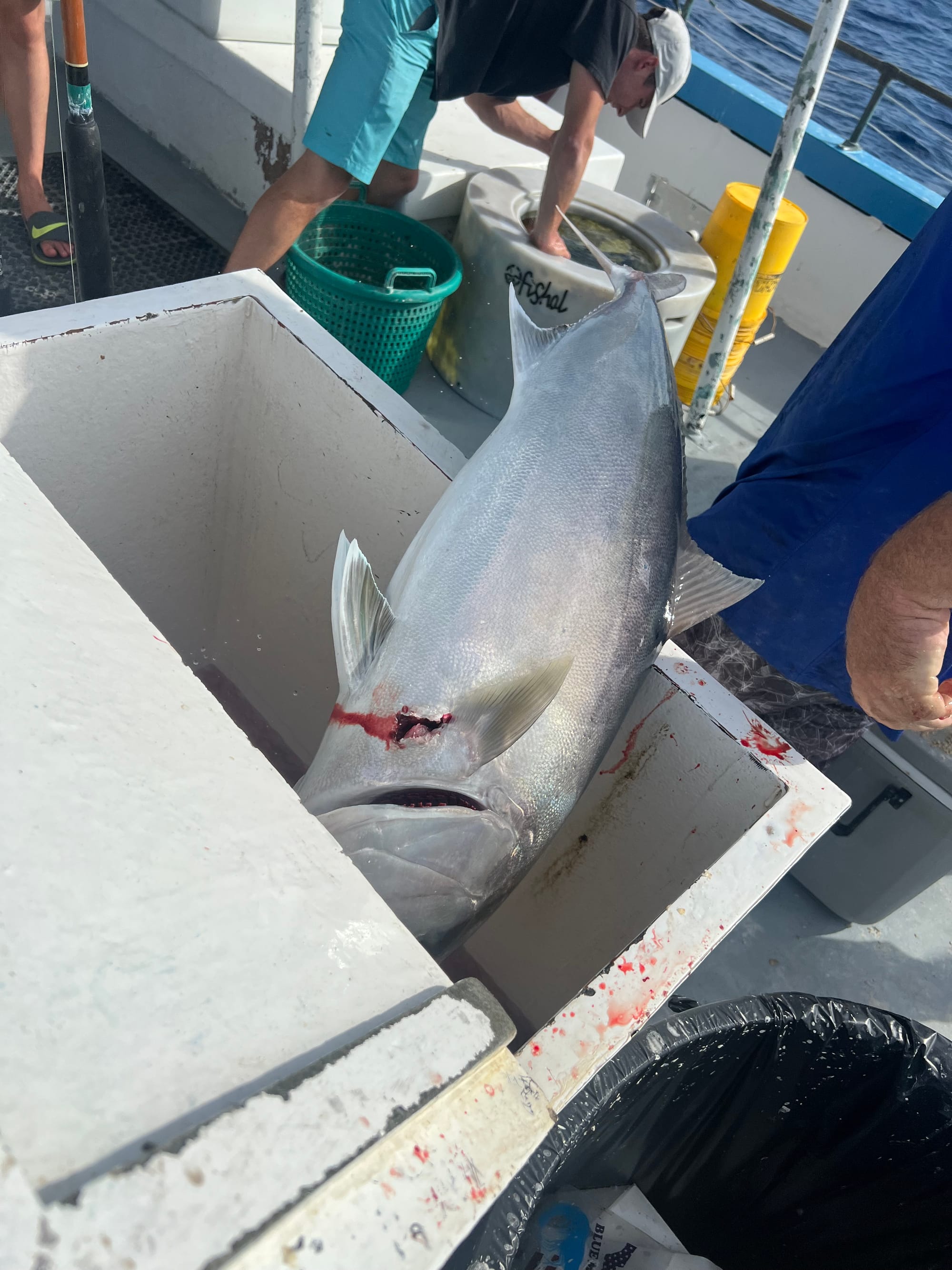Born to Fish, Forced to Work
The secret sauce that made the fish go so wild was a mixture of oatmeal, chum, seawater, and sand. A single tear came to my eye, so amazed was I that they could sell sand to a fish.
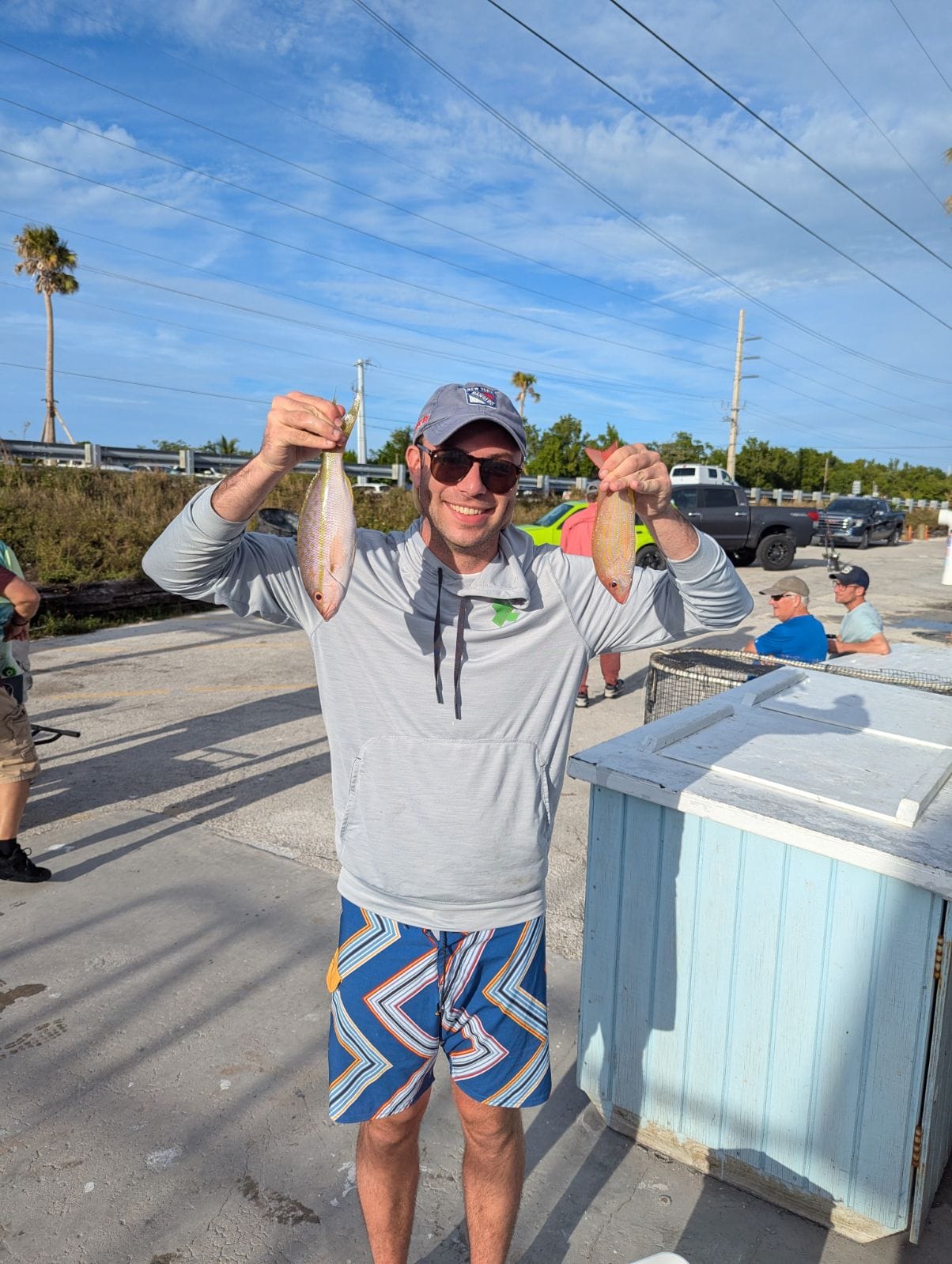
Andrew, the captain, and Seth, the mate, made up the crew of Miss Islamorada. For anybody looking to hack into my bank, the captain and mate had my uncle’s first and middle names, respectively. Only toward the third act of the voyage, when Seth, who in voice and mannerism recalled my other uncle, addressed me by name and had me reel in my line for a re-bait, did I realize I was losing. He’d clipped the head and tail off a ballyhoo—so it wouldn’t spin—and said “alright, Jake, let’s catch you a grouper.”
A middle aged man had just reeled in a whopper, a red grouper maybe 30 inches, well above the 20-inch legal minimum. What did he use for bait? His buddy asked. A piece of squid and $20, I joked. It was December 26th, and grouper season ends on the 31st. Like a wise old cop in a B movie, the grouper was domed to bleed out in the ice bucket, gasping “I was five days from retirement…” as he breathed his last.
I did as I was told, broadly. Opened the bail, kept my thumb on the line, eased it out until it hit the bottom. Then, I reeled it back up a few turns to get above the coral. At that point, the guidance ran out, because I guess it was obvious: if you catch a fish, reel it in; if you feel a tug and lose the bait, replace it. Don’t hang dinner over the side, and be sure to land every fish on the deck.
After a few seconds I had my bite. I reeled and reeled, but it wasn't much of a fight. The last guy had struggled against his over fifteen rounds, but here I was leisurely reeling, in the perfect flow state of light challenge but no struggle.
Up it came, all seven inches of red grouper. The grouper catcher, who’d brought his own pliers, de-hooked my lil buddy. He asked if I wanted to take a picture. I didn’t, I said, think this was one for the books. Well, we got you the right species—just the wrong size, Seth laughed.
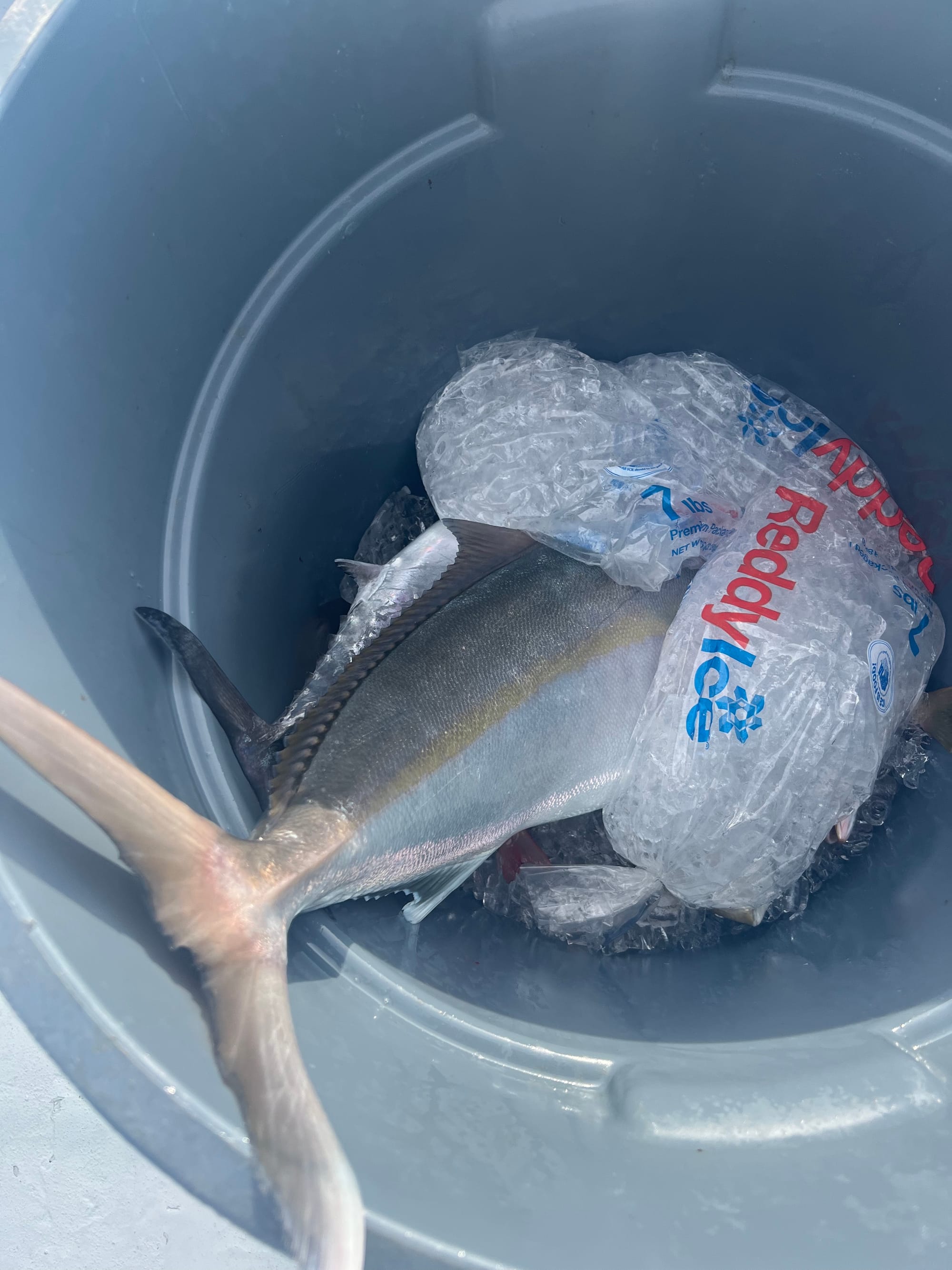
Fishing has more superstitions than baseball—special lures, different baits, sacred spots—and is really more gambling than hunting. The cowboy hats, the sunglasses, the capacity to sink to the darkest depths of the sea, it’s all there. My ten fellow passengers knew this. A couple of brothers from rural Michigan, three 65ish year old buddies with nuanced opinions on the coronavirus epidemic, another guy about their age but who came stag, and a Miami-based eastern European family of four—moody, tall teenage boy, 30ish year old daughter, wife but seemingly not mother of indeterminate age, and father with a dyed buzzcut, limited English, and the jowls of a Nixon impersonator.
I’d introduced myself to everybody, but I forgot each name before the end of its associated handshake. The guy who came stag and one of the three epidemiologists, dressed both in Khaki, seemed fungible, and it didn’t help that one of them changed his outfit while trying to change his luck. The other one caught the grouper, though. The taller guy in the red fishing shirt spent too much time inside, while the one in the black Salt Life tee seemed like their leader.
The Michiganders, the handsome, clean cut brother was the expert. He saw me leave my six pack and sandwich on the bench when I got on the boat and showed me instead where to put it below deck, in the corner so it would stay dry and wouldn’t rustle about. Good luck, he said. I reciprocated, only then realizing I needed luck. His vape battery had both lightning and USB-C attachments, so it was easy for Seth to plug it in for him.
His brother looked like a high school bully, with a buzzcut and a vibe that was taller than he was. He wanted to catch a big fish, a predator, maybe even a shark. They brought their own rods, and they engaged in a couple of pretty big fights, even getting Andrew to come jogging over with the net. They couldn’t have been much younger than I was, and they’d been out at least once with the boat before, but still they peppered Andrew and Seth with questions. What's the best bait? Whatever they eat. How many spots do you like to go to in a day? Preferably just one.
Andrew had grown up in Orange County New York, where he’d fallen into seasonal work at a ski resort after school. One summer, a guy he knew offered him a gig on a fishing boat. Over the years, he became a captain and the proud owner of some well-worn calluses. The way the guy grabs and unhooks a fish, you’d think he had grip tape for palms and pliers for fingers.
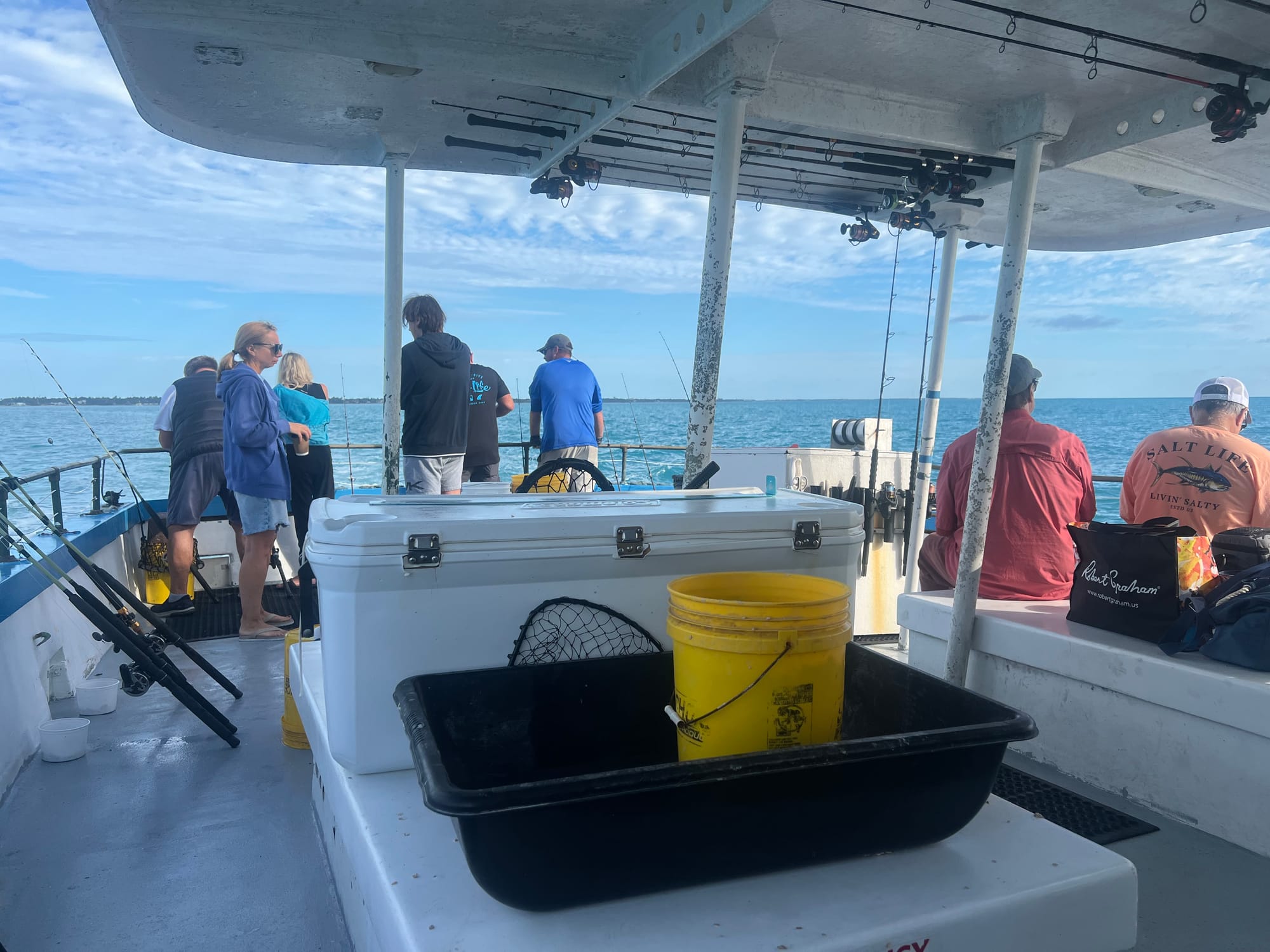
His mother is still up there, so he finds himself on landscaping duty when he visits. This gave him and the buzzcut Michigander, who worked in tree removal, much to talk about. The mother’s property is covered in Black Walnut, which I haven’t had the chance to Google why they said that was the best wood there is. One year, he didn’t have time to head up there. Over the phone, he told her to wait until the tree put the power line at risk, then call the town. The town will come cut it down, but they won’t remove it. Just leave it by the side of the road, and some hick will come cut it up for firewood. Sure enough, she told Andrew over the phone, she saw a couple possum-eaters staring at her car guiltily, headlights reflected in their eyes, when she pulled in one evening. They loaded the balance of the wood into the truck bed and peeled out.
On our voyage, we were to do two types of fishing. Bottom fishing, where the lead weight does most of the work, per my above instructions, and drift fishing.
For the latter, we had to go off the back of the boat, which had limited space. Hence, we were split into two groups, each of which was promised equal time, if not equal catch. This was a source of potential anguish because, when at the first spot the father (a member of group 2) went to grab a drift rod during group 1’s allotment, the crew yelled and yelled at him until his family translated his misdeed. Time at the drift is not to be taken lightly.
We anchored at the first spot, and Seth tossed a bucket of what appeared to be oatmeal off the back, setting off a frenzy. We were told to take the head and tail off our shrimp, stick the hook through the neck, then open our bail and hand it back to him. He packed it into a snowball, wound some line around it a few times, and threw it off the back with more beer pong toss than baseball throw.
After he threw the snowball, we were to keep our bail open as the line drifted off, attracting fish that fed near the surface. When the line started to go out faster, we would know we had a fish, close the bail, and fight like hell.
Be aggressive, he told us. I asked what that meant, and he said just reel as hard as you can and don’t be afraid to put some muscle into it. Don't relish the fight. We’re not the only predators in these waters, he said for not the last time.
The secret sauce that made the fish go so wild was a mixture of oatmeal, chum, seawater, and sand. A single tear came to my eye, so amazed was I that they could sell sand to a fish. On his first toss for me, I caught a yellowtail snapper big enough to keep. Wow, I marveled, this really is just like shooting fish in a barrel. The group leader pulled up a bonito, which was different than the bonitos you eat. Sushi you give your mother in law, Seth explained. Bonito flakes, not a nautical breakfast cereal, come from an entirely different fish.
The next fish I caught, another yellowtail, clocked in just below the minimum 12 inches. Seth threw it back, and a pelican gobbled it up before it recovered its senses. Too small to keep, but big enough to feed to a bird, I said ruefully. Doesn’t the pelican have to measure its catch? That bird’s got more rights than you and me have, Seth sighed.
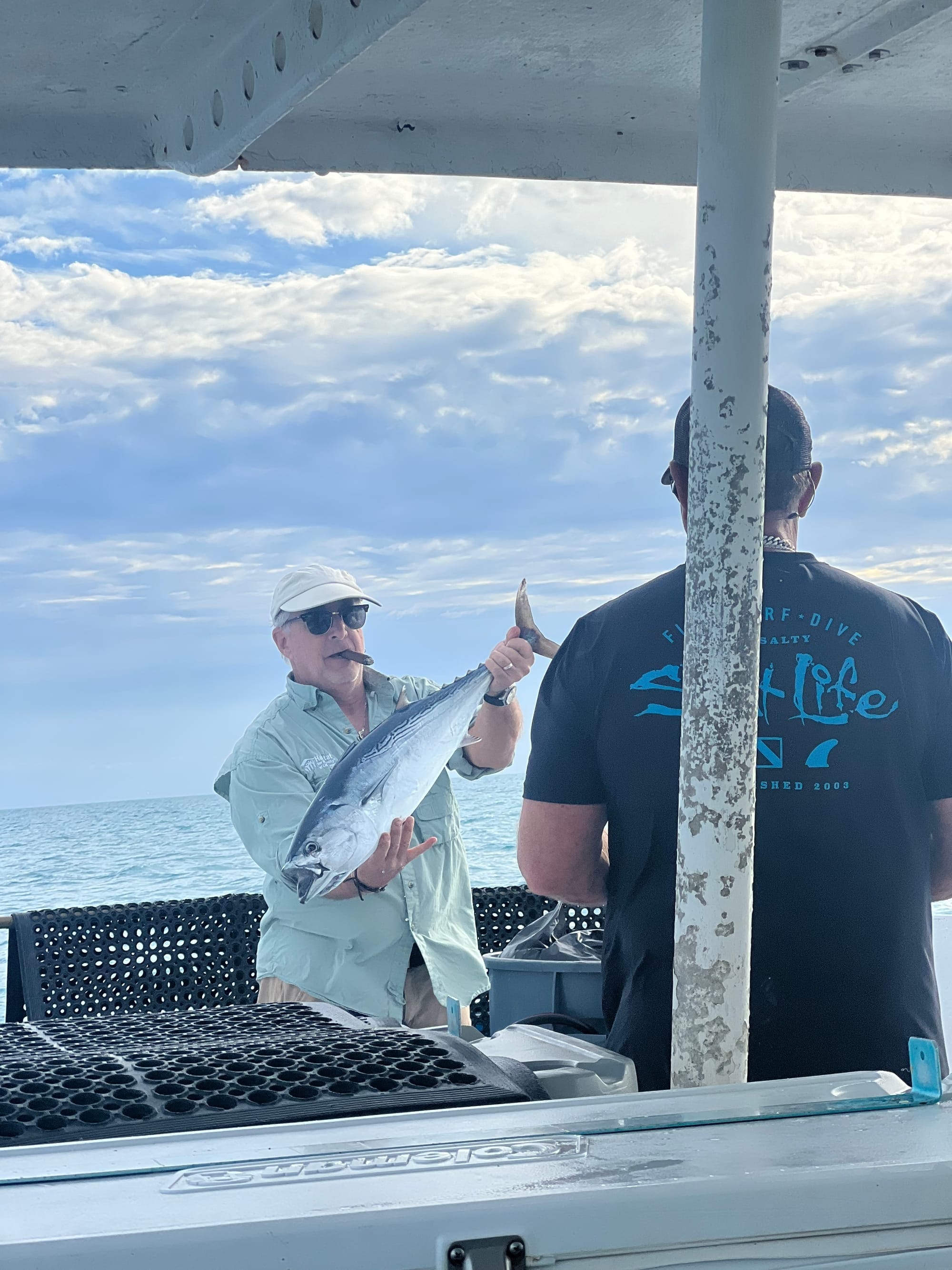
In fact, I was aiming at exceedingly small fish in the world’s largest barrel. My next few weren't keepers, either. We puttered off to a fresh spot.
Group 2 was up, and I guess there was less to worry about because Andrew dropped his own line. He and one of the fungible guys each pulled up a sand tile, which is related to the tilefish but is not good to eat, so they threw them back. Related fish can be eaten in other places, but apparently there’s something the fish eat here that messes with their taste.
Despite the hullabaloo he caused earlier, the father kept bottom fishing and missed his drift at bat. He pulled up a pretty good sized porgy. These are typically good eating—I had caught and eaten some off Rikers on a trip with some friends—but here as well some have the same issue as the sand tile.
You’ll cook them right up, and nine out of ten times it’s good, but on that tenth time you know you’ve eaten something rotten, Andrew explained. I hope I don’t catch a porgy, I thought, imagining everybody in my family sprinting through the restaurant, sick to our stomachs off my catch. Never bet against yourself. Pretty soon, I caught one lane snapper which, though maybe 9 inches, had a minimum length of 8. It looked like a toy, but damnit if it wasn’t mine.
The Michiganders asked for one of the grunts I’d caught, to use that as bait. They left the rod there and went about their business. Sure enough the reel began to spin, and they entered a fight against something we never had the chance to see. Might’ve been a shark, Seth said, and they explained they were using their own tackle and were hoping to catch just that. They delivered this sheepishly, but Seth told them whatever they caught was their business. Emboldened, I opened my first beer.
A montage of engines turning on, beers cracking, and anchors weighing ensued over the next four spots. I caught maybe two more too-small fish, while the brothers lost another fight but managed to bring in a pretty big amberjack. Somebody caught a hogfish they couldn’t keep, and more normal looking stuff came in up until the fungible guy caught his grouper, granting us hope. I caught mine, extinguishing that flame.
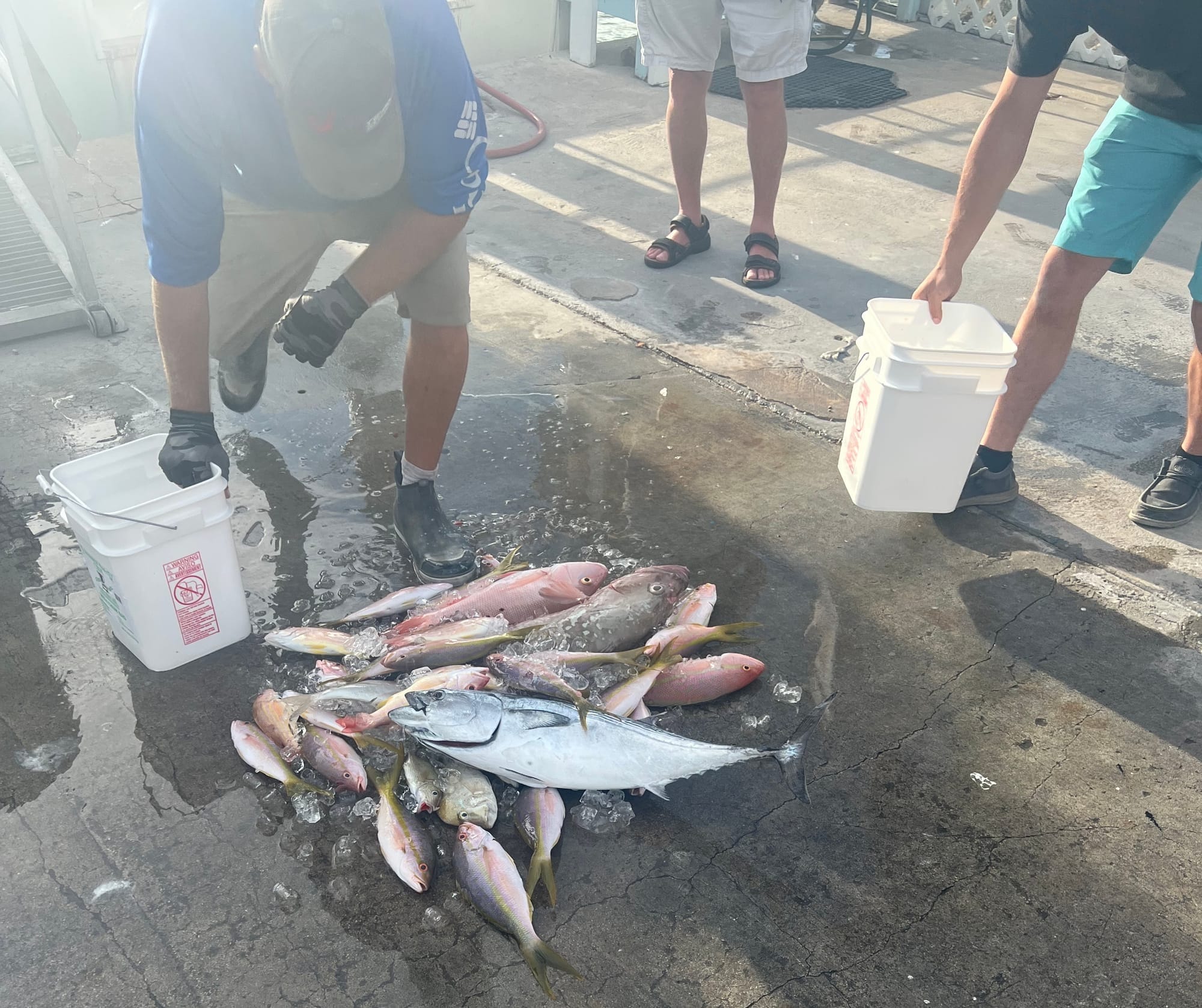
At the dock, they poured our fish out onto the ground and sorted through whose was whose. They mumbled a half apology that today we’d been at a cold table, as the haul was a less than people might’ve hoped for on a clear day with so little wind.
Mr. Grouper left Seth a few yellowtail, as he was had plenty to eat without it. In no time, I had four tiny fillets o fish, I tipped, and I thought I’d head out. Hold on, Seth said, putting his filet knife against one of Grouper Man’s surplus, are you hungry?
Sure, I said, preparing to eat whatever raw delicacy he pulled out of the snapper. He sliced up the next three and tossed them in my bag, which got much heavier. I marveled at my charity fish and thought about what the brother said when I asked how they caught the amberjack.
Well think about it. You throw out some squid, you’re gonna get something that eats squid. You throw out some shrimp, you’re gonna get something that eats shrimp. We throw out what you caught, guess what. I don’t know why everybody was throwing back such good bait.
Maybe it’s a numbers game, I thought to myself as I tossed the empty six pack yoke and made my way home with my sympathy snapper. On Christmas Eve, when I had told my family I was thinking of going out on one of the group fishing boats, we had laughed about a piece of performance art—how far would a guy get if he got on the boat, sat in the shade, and made his way through 12-18 beers without dropping a line? How far could I get with a little bit of squid, a sixer, and $40?
